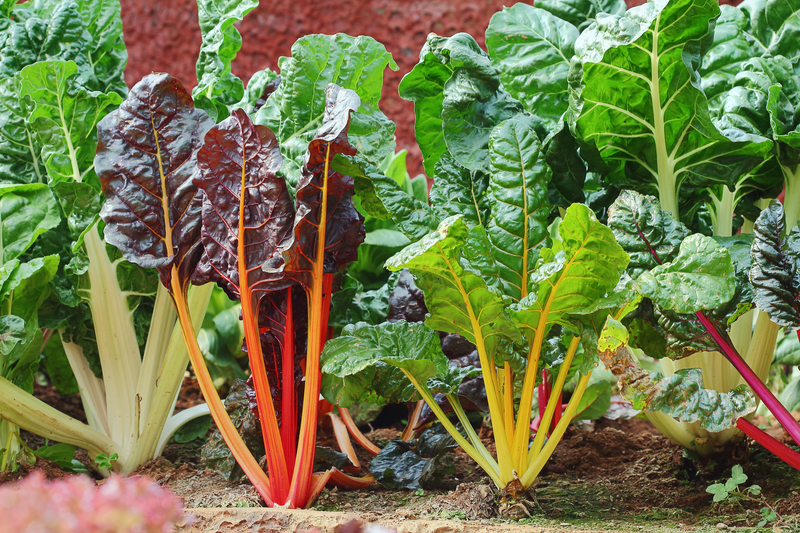Transforming Organic Waste into Fertile Soil
Posted on 08/06/2025
Transforming Organic Waste into Fertile Soil: A Comprehensive Guide
Organic waste is commonly seen as a problem, but what if it could become a powerful solution for soil fertility? This article delves deep into the process, principles, and profound benefits of transforming organic waste into fertile soil.

Understanding the Significance of Organic Waste Conversion
Organic waste, including kitchen scraps, yard trimmings, and certain agricultural by-products, accounts for a significant portion of global waste. Converting organic materials into nutrient-rich soil addresses waste management challenges while enriching soil ecosystems, promoting sustainability and boosting agriculture.
What Constitutes Organic Waste?
Organic waste refers to biodegradable materials from plant or animal sources that can be safely broken down by microorganisms. Common examples include:
- Fruit and vegetable peels
- Coffee grounds and tea leaves
- Grass clippings and garden trimmings
- Eggshells and nutshells
- Food scraps
- Leaf litter
The Science Behind Soil Fertility
Fertile soil is the lifeblood of productive agriculture. It brims with essential nutrients, a balanced pH, and organic matter to support plant growth. When organic waste is transformed into fertile soil, it enhances:
- Soil organic matter content, improving structure
- Water retention capacity
- Microbial biodiversity and activity
- Availability of essential plant nutrients (nitrogen, phosphorus, potassium)
How Organic Waste Boosts Soil Health
Decomposed organic materials act as a slow-release fertilizer, steadily nourishing plants over time. They also encourage root development and help suppress pests and diseases by fostering beneficial organisms.
Methods for Transforming Organic Waste into Fertile Soil
There are several effective techniques for converting organic waste into valuable soil amendments. The method you choose depends on your resources, space, and sustainability goals.
1. Composting: The Traditional Cornerstone
Composting is the process where organic matter decomposes under controlled aerobic (oxygen-rich) conditions. The result is a dark, crumbly material - compost - loaded with nutrients. Composting can be done at various scales:
- Backyard Composting: Homeowners collect food scraps and yard waste in compost bins or heaps, turning the pile periodically to aerate and speed decomposition.
- Community-Scale Composting: Neighborhoods or municipalities organize larger composting programs to process organic waste collectively.
- Commercial Composting: Industrial facilities use advanced techniques for processing vast quantities of organic material efficiently.
Key Steps in the Composting Process:
- Layering: Alternate 'green' nitrogen-rich materials (fruit/vegetable scraps, coffee grounds) with 'brown' carbon-rich materials (dried leaves, straw, newspaper).
- Aeration: Turn the pile every 1-2 weeks to maintain oxygen flow and speed up decomposition.
- Moisture Control: Keep the pile damp but not sluggishly wet; aim for a wrung-out sponge consistency.
- Monitoring: Maintain a balance to avoid odors or pests. Finished compost is dark, sweet-smelling, and crumbly.
2. Vermicomposting: Harnessing the Power of Worms
Vermicomposting employs earthworms, primarily Eisenia fetida (Red Wigglers), to digest organic matter. Their castings, or worm manure, are incredibly rich in nutrients and beneficial microbes, making them a superior soil enhancer.
- Set Up: Use a specialized bin with bedding (moistened newspaper, coconut coir) and introduce worms.
- Feed: Add small, regular amounts of kitchen scraps, avoiding meat, dairy, and oily items.
- Harvest: Every few months, collect the castings to enrich your garden or potted plants.
3. Bokashi: Fermenting Your Food Waste
Bokashi is a Japanese method that uses anaerobic (airless) fermentation to break down organic waste, including items not recommended in traditional composting (meat, dairy, cooked foods). Specialized Bokashi bran inoculated with beneficial bacteria expedites the process.
- Fermentation: In an airtight bucket, alternate food waste layers with Bokashi bran, pressing down to remove air.
- Burial: Once fermented (about two weeks), bury the pre-compost in soil where it quickly decomposes, energizing the earth with nutrients and microorganisms.
4. Municipal and Industrial Scale Tech
Technological advances enable cities and large industries to convert significant volumes of organic waste into soil amendments using:
- In-vessel composters
- Enclosed aerobic digesters
- Anaerobic digesters producing biogas and digestate (used as fertilizer)
These approaches help reduce landfill dependency and generate renewable energy.
Benefits of Turning Organic Waste into Fertile Soil
The practice of transforming organic waste into fertile soil provides an array of environmental, economic, and social benefits:
1. Reduces Landfill Waste
- Diverting organic waste from landfills curbs greenhouse gas emissions, particularly methane - a potent contributor to climate change.
- Cuts costs associated with landfill management and waste transport.
2. Revitalizes Soil Ecosystems and Agriculture
- Enriches soil structure and fertility for gardens, farms, parks, and landscapes.
- Reduces reliance on chemical fertilizers, fostering more sustainable agriculture.
- Support for local food systems and healthier produce.
3. Promotes Biodiversity
- Encourages healthy microbial, insect, and earthworm populations in the soil.
- Enhances natural pest control and pollination services.
4. Potential for Energy Generation
- Industrial-scale anaerobic digestion of organic waste can yield biogas for electricity and heat, with the residual "digestate" as a soil amendment.
Best Practices for Efficient Organic Waste Transformation
Sorting and Preparation
- Segregate organic waste from plastics, metals, glass, and hazardous materials.
- Chop large items to accelerate decomposition.
- Avoid contaminated or heavily processed foods where possible.
Balancing Carbon and Nitrogen
Successful composting and vermicomposting depend on a proper balance of carbon-rich and nitrogen-rich materials:
- Carbon ("Browns"): Dried leaves, straw, paper, cardboard
- Nitrogen ("Greens"): Fresh grass clippings, vegetable peelings, coffee grounds
Ideally, maintain a carbon to nitrogen ratio of 25-30:1 for active microbial activity.
Patience and Observation
- Transformation takes time - from several weeks (hot composting) to several months (cold composting).
- Monitor moisture, temperature, and odors to ensure optimal decomposition.
- Adjust the mix if necessary to prevent issues such as odors or pests.
Common Challenges in Organic Waste Conversion
Odors and Pests
Poorly managed compost can attract rodents and insects or produce foul smells. Remedies include:
- Covering food scraps with browns or finished compost
- Maintaining balance and aeration
Incomplete Decomposition
If your compost is not fully breaking down, review your carbon/nitrogen balance, moisture, and aeration. Shredding materials and turning the pile more frequently can help.
Excess Moisture or Dryness
- If the heap is too wet, add browns and turn for aeration.
- If too dry, sprinkle with water and blend greens in.
Applications for Fertile Soil Created from Organic Waste
The compost, vermicompost, and Bokashi soil amendments produced from organic waste can be applied in multiple settings:
- Home Gardens: Mix into vegetable beds, flower beds, and potted plants
- Lawns and Landscaping: Top-dress lawns, shrubs, and ornamental plants
- Agricultural Fields: Large-scale application for crops
- Community Green Spaces: Parks and urban gardens thrive on enriched soils
- Tree Planting and Erosion Control: Helps with root establishment and reduces soil erosion
Environmental Impact of Organic Waste Transformation
By transforming organic waste into fertile soil, humanity can make remarkable strides toward environmental stewardship:
- Reduces greenhouse gas emissions from landfills
- Improves soil carbon sequestration, mitigating climate change
- Minimizes chemical runoff and pollution from synthetic fertilizers
- Encourages circular economy principles by returning nutrients to the earth
Innovative Trends and Technologies in Organic Waste Recycling
Smart Composting Systems
Today, tech-driven composters with sensors and automation optimize temperature, moisture, and mixing, making home and community composting more accessible and efficient.
Biochar Addition
Adding biochar--a form of charcoal produced by pyrolyzing organic waste without oxygen--improves soil's water holding capacity, carbon retention, and microbial life when blended with compost.
Closed-Loop Urban Agriculture
Cities worldwide are closing the loop from food consumption to organic waste transformation and then urban farming, creating sustainable cycles of soil renewal, food production, and waste reduction.

Getting Started: Tips for Home Gardeners and Households
- Start small with a countertop compost pail or worm bin.
- Engage your community: Share tips and compost with neighbors or local community gardens.
- Educate yourself and family members on what can and cannot be composted.
- Track your impact: Measure reduced waste, better plant growth, and personal satisfaction from contributing to sustainability.
Conclusion: Unleashing the Potential of Organic Waste
Transforming organic waste into fertile soil is more than a waste management strategy--it is the heartbeat of regenerative agriculture, food security, and environmental health. Whether you are a home gardener, farmer, or municipal planner, embracing this cycle closes the loop on nature and builds resilient, sustainable communities. With the right knowledge, tools, and commitment, anyone can contribute to this vital movement for a greener, healthier planet.
Frequently Asked Questions (FAQs)
- Can I compost cooked food?
With Bokashi, yes, but in traditional composting, avoid meat and oily foods to prevent pests. - How long does it take to turn organic waste into fertile soil?
Composting generally takes 2-6 months; vermicomposting might yield results sooner. - Is composting suitable in apartments?
Yes, vermicomposting and small home composters are excellent options for limited spaces.
Ready to start transforming your organic waste into fertile soil? Begin today and join the movement for healthier soils and a brighter environmental future!
Latest Posts
Master the Art of Cultivating Your Own Herb Oasis
9 Essential Gardening Tips Every Beginner Should Know
Unlocking the Potential of Gardening to Fight Climate Change

